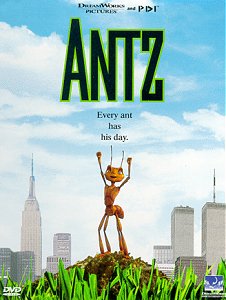
ANTZ
US, 1998, 83 minutes, Colour.
Voices of: Woody Allen, Dan Aykroyd, Anne Bancroft, Jane Curtin, Danny Glover, Gene Hackman, Jennifer Lopez, John Mahoney, Paul Mazursky, Grant Shaud, Sylvester Stallone, Sharon Stone, Christopher Walken.
Directed by Eric Darnell and Tim Johnson.
It has been done before, but why should the animal world be the multi-million dollar Hollywood symbol for contemporary allegories of human life? What was it in the American psyche that Pixar Studios and Dreamworks Studios recognised that persuaded them to spend years computer-animating the movies A Bug's Life and Antz and unleash them on willing and, as it turned out, eager audiences? I am not sure that many humans have a passion for ants, but we are certainly far more sympathetic after these movies than we were before.
The 'done-before' refers to Mr Bug Goes to Town, directed by Dave Fleischer in 1941 which, after not too successful a box-office response, was given a zippier title, Hoppity Goes to Town. It was the struggle between insects and humans (probably relevant in the atmosphere of World War II and the imminent attack on Pearl Harbour).
The 'done before' also refers to 1984's George Orwell's allegory of half a century ago, Animal Farm, which was filmed in animation in Britain and released in 1955, an allegory of tyranny amongst the animal themselves and reflecting Western attitudes towards the dominating socialism of Stalinist Russia.
Maybe animals are what T.S.Eliot calls 'objective correlatives', poetic and symbolic equivalents of human experience. After all, in Antz, we are back in a conformist world where the workers are the workers and unquestioningly do the workers' thing while the soldiers are the soldiers. What odds for it to be Woody Allen as Z (symbolic put-down alphabetical name?) to buck the system by rebelling and imagining that he could be something else (even to refusing to dance in conformist rhythm?)?
Well, Antz was written and computer-drawn more for adults than for children and Woody Allen was never more one of his own characters than Z, whether on the ant-psychiatrist's couch, or wooing the unattainable Princess Sharon Stone, though his yarns with Sylvester Stallone's soldier are entertaining introvert-extravert exchanges.
1. The impact of the film? Entertainment? Message? Animation style? The drawing, the movement, the layouts, the environment? The film for adult audiences? Children?
2. The strength of the voice cast, Woody Allen and his being the character of Zed? The other voices and their appropriateness? The drawings illustrating the characteristics of the actor voicing the character?
3. The themes, work, worker ants, class struggles, the overtones of Animal Farm? The film as an allegory of the human race?
4. The focus on Zed, Woody Allen, his voice, expressions, Zed sounding like a typical Woody Allen character? The therapy? An ant with ideas?
5. The world of the anthill, the visualising of the interiors? The worker ants, the millions of them, Zed as one in five million? The importance of conformity? The babies, the workers, the soldiers?
6. The routines in the ant world, the collection of food, the hierarchy? No free time – except for training? Seeing Zed at work, the morale, the team? Team spirit? The ants and their being walked over? The ants being part of the destruction ball, swinging – and being the ball?
7. The general, his character, the voice of Gene Hackman? The name: General Mandible? The importance of the tunnel, the schedule? Colonel Cutter, Christopher Walken’s voice and style, the assistant to the general? The other assistants? The revolution? The general, his interactions with the queen, getting permissions?
8. The princess, Sharon Stone’s voice and style? Her talking with the general, his being her fiancé, talking about war, with the queen, expectations of Princess Bala? Her wanting to go to the dance?
9. The princess at the dance, her meeting with Weaver, Weaver and his friendship with Zed? Weaver as the Sylvester Stallone type, the soldier, his appearance, muscles, voice? At the dance? The ants dancing in conformity? The theme of the Lords of the Earth? The information about a better place? Issues of democracy? Zed and his being arrested?
10. The visualising of the dance, the conformity, ‘Guantanamera’, the fight, Weaver?
11. The aftermath? Zed almost like a child in love, the work, wanting to change places with Weaver to see the princess? The soldiers’ dormitory? Zed in his plane, Zed and his rehearsing his speeches for the princess? Going on parade? The general’s speech on sacrifice? Sound Off? The termite attack, the battle, Zed and his being involved in the war, his life being saved?
12. Weaver and his enjoying the work in the mine, the two hands with the picks, his sex appeal? The threatening of downsizing? The taking of the rations?
13. In the mine, the character of Barbatus? His help? Separated from the body of the group? The advice? Zed being urged to think for himself?
14. The general angry with Zed as hero, the applause, the reaction of the queen, the princess? The difficulties? The arrest?
15. Colonel Cutter and his decisions, turning against the general? The defeat of the general, his being unmasked?
16. Peace within the ants’ world, Zed and his being a hero, the relationship with the princess? Acceptance by the queen? Weaver and his future?
17. The delineation of the supporting characters, their role in the plot? Chip, Muffy, Barbatos, Azteca, Grebs, the drunken scout? The foreman? The importance of the psychologist and the interviews with Zed?
18. The humour, the entertainment, the contribution of the actors? The visuals? The themes and the allegory?